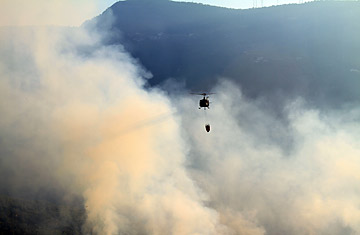
A Lebanese helicopter prepares to dump water on the flames of a forest fire near the mountain village of Fatri, north of Beirut, on Dec. 5, 2010
The residents of the tiny north Lebanon village of Fatri were calling it a miracle Monday morning as they emerged from their homes into a watery dawn. Twenty-four hours earlier, orange flames had leaped from tree to tree up the precipitous slopes of the densely wooded Adonis Valley, nearly cutting off isolated Fatri and its 2,000 inhabitants perched high above the Ibrahim River. The residents had abandoned the futile battle against the fire, which had been burning for a week, and had retreated into their homes and the small village church to pray for rain. Deliverance came two hours before dawn Monday when Lebanon received its first rainfall in more than two months.
"We had given up trying to save the forest but were thinking only of saving our homes, families and babies. We all prayed for the fire to go out and it did. It's a miracle," said Bashir Gemayel, an official of the Fatri municipality. The cloudburst helped douse more than 120 fires nationwide that had turned forests of Mediterranean oak and umbrella-pine trees and farmers' olive groves, almond trees, vineyards and cherry and apple orchards into blackened wastelands.
The dawn rain that lashed the eastern Mediterranean also helped extinguish the deadly wildfire on Mount Carmel near Haifa in northern Israel. Israeli fire services assisted by aircraft from Greece, Turkey, Britain, Cyprus, Russia and France had struggled to contain the huge blaze. On Monday, Ahuva Tomer, Haifa's chief of police, died of injuries sustained in the forest fire last Thursday. Her death raised to 42 the number of people killed in the four-day conflagration, with another 34 injured, and came the same day a 14-year-old boy who was reportedly smoking a water pipe in the area was arrested as the prime suspect.
The Turkish firefighters who had helped in Israel were planning to head a little further north on Monday to help Lebanon douse its multiple wildfires. Lebanese firefighters could do little to control the larger blazes, hampered by a lack of suitable equipment, difficult mountainous terrain and, in the south, the additional hazard of land mines and unexploded cluster munitions left over from the 2006 war between Israel and Lebanon's militant Shi'ite Hizballah movement.
Brush fires are common in Lebanon at the end of the dry summer months, but they normally fizzle out with the onset of the fall rains. This year has witnessed an unprecedented dry spell and unseasonably high temperatures, turning Lebanon's rural areas into a tinderbox and imperiling farmers who rely on the rains to irrigate their crops and fill depleted aquifers. Mohammad Rahhal, Lebanon's Environment Minister, described the forest fires as a "catastrophe to the environment, tourism industry and the economy."
Before Monday's downpour, Lebanon's meteorological office had registered just 2.01 inches (51.2 mm) of rainfall since September, compared to 8.45 inches (214.8 mm) for the same period last year.
And Lebanon's neighbors are not faring much better, with Israel, Jordan and Syria all experiencing extended dry spells. Northeastern Syria has suffered four years of successive droughts, which have left 2 million to 3 million people living in extreme poverty, according to U.N. figures. Thousands of inhabitants of the arid northeastern region have abandoned their homes and now live in settlements closer to Damascus in the hope of finding work. With once productive arable land turning into desert, Syria has gone from being an exporter of wheat to an importer.
Lebanon's traditionally abundant water resources have long made it the envy of the region. Its coastal limestone mountain range reaches almost 10,000 ft. (3,000 m) and serves as a vast natural reservoir, topped up by rain and snow melt. But shoddy infrastructure and decades of poor government planning have seen much of the water wasted, either gushing from broken pipes or flowing uninterrupted into the sea. Groundwater levels have steadily dropped in recent years as farmers dig ever more wells to pump up the precious liquid to irrigate crops. And owners of Lebanon's ski resorts gaze anxiously at blue skies and predict another short season. One resort has even opened a grass piste for all-year skiing because of the unreliable snowfall.
"We are having less and less snow each year and the snow is getting wetter and wetter. We used to have powder snow, but not anymore," says Christian Francis, a Lebanese ski instructor and cross-country racer.
The warm weather and cloudless skies spurred worried Middle Easterners to turn to God for help. In Jordan and Lebanon last week, Muslim clerics held special prayers for rain. In Israel, Rabbi Ovadia Yosef, the spiritual leader of the ultra-orthodox Shas movement, said the calamitous Mount Carmel fire was divine punishment for failure to properly obey the command to observe the Shabbat. In unlikely agreement with Yosef was Ismail Haniya, the Hamas Prime Minister in Gaza, who also believed the wildfire was divine retribution, although not for insufficient piety. He called it a "strike from God" to punish Israel for its treatment of the Palestinians.
The villagers of Fatri, too, believe that their homes were saved by divine intervention. The only flame visible Monday was a single candle burning in the church, but the village was suffused with the acrid stench of smoke. "It's a disaster for our village. We have lost many valuable trees and crops," says Imad Tawk, the mayor of Fatri.
A few faint coils of smoke continued to rise from dying embers on the charred slopes below the village. But unless Lebanon and its neighbors receive more plentiful rainfall soon, the residents may find that prayers are all they have to stave off future wildfires.
